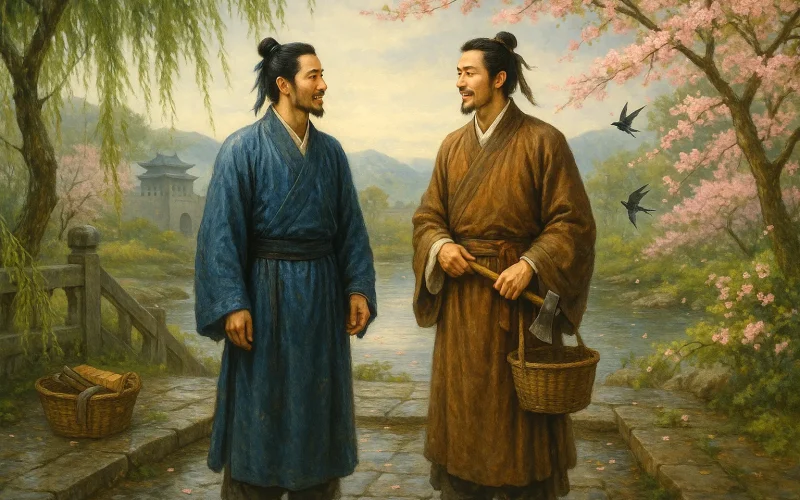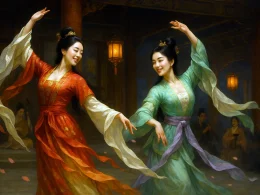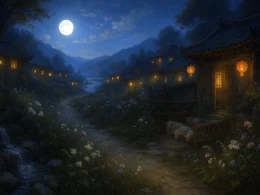Out of the east you visit me,
With the rain of Baling still on your clothes,
I ask you what you have come here for;
You say: "To buy an ax for cutting wood in the mountains"
…Hidden deep in a haze of blossom,
Swallow fledglings chirp at ease
As they did when we parted, a year ago…
How grey our temples have grown since them!
Original Poem
「长安遇冯著」
韦应物
客从东方来,衣上灞陵雨。
问客何为来,采山因买斧。
冥冥花正开,扬扬燕新乳。
昨别今已春,鬓丝生几缕。
Interpretation
Composed during Wei Yingwu's service in the capital Chang'an, this poem recounts an unexpected encounter with his reclusive friend Feng Zhu, a virtuous scholar thwarted in official career who dwelled in mountain forests. Through this chance meeting, the poet expresses deep concern for Feng while meditating on life's vicissitudes. Its lighthearted tone belies profound emotional depth, exemplifying Tang literati camaraderie and philosophical reflection.
First Couplet: "客从东方来,衣上灞陵雨。"
Kè cóng dōngfāng lái, yī shàng Bàlíng yǔ.
My friend comes from eastern hills— His cloak still drips with Baling's rains.
The opening situates their meeting—"eastern hills" (东方) suggests Feng's reclusive origins, while "Baling's rains" (灞陵雨) evoke this famous farewell site's legacy, subtly acknowledging Feng's unfulfilled talents through historical resonance.
Second Couplet: "问客何为来,采山因买斧。"
Wèn kè hé wéi lái, cǎi shān yīn mǎi fǔ.
"What brings you here?" I ask. He smiles: "To mine the hills—but bought an axe for firewood."
This humorous Q&A disguises Feng's career frustrations—"bought an axe" (买斧) metaphorizes compromised ambitions, the jest's levity underscoring life's harsh realities.
Third Couplet: "冥冥花正开,扬扬燕新乳。"
Míngmíng huā zhèng kāi, yángyáng yàn xīn rǔ.
When last we parted—flowers bloomed unseen, Swallows fed new fledglings mid-flight.
Recalling their spring separation, these images of hidden blossoms (花正开) and nurturing birds (燕新乳) become subtle encouragements—nature's quiet persistence mirroring life's potential renewal.
Fourth Couplet: "昨别今已春,鬓丝生几缕。"
Zuó bié jīn yǐ chūn, bìn sī shēng jǐ lǚ.
That "last spring" renews today— New silver threads now streak his hair.
The closing temporal shift—from past parting to present reunion—spotlights time's passage through Feng's graying temples (鬓丝), transforming casual observation into poignant mortality meditation.
Artistic Features
The poem employs question-answer dynamics to enhance conversational intimacy. Its deceptively simple language—particularly the axe-for-mining metaphor—conveys layered meanings through precise imagery. Seasonal symbols (flowers/swallows) and temporal markers (hair graying) structure its philosophical progression from happenstance meeting to existential contemplation.
Holistic Appreciation
While chronicling a friendly encounter, the poem ultimately traces life's cyclical disappointments and quiet hopes. The opening's damp cloak (1) yields to self-deprecating humor (2), then transitions through nature's resilience (3) before confronting time's irreversible marks (4). This movement from external observation to internal reflection demonstrates Wei's ability to find cosmic significance in mundane reunions.
Insights
The work suggests that friendship's greatest gift lies in recognizing unspoken struggles—whether through shared laughter at failed ambitions or silent acknowledgment of aging's toll. For Feng, the poet's delicate balance of jest and seasonal symbolism offers solace: as sure as swallows nurture young, new opportunities may yet emerge from apparent defeat.
Poem translator
Kiang Kanghu
About the poet

Wei Yingwu (韦应物), circa 737 - 786, was a native of Chang'an, Beijing. His poems were collected in the Wei Suzhou Collection, which included poems concerned with the plight of the people, expressions of disobedience to the times and indignation against the world, and descriptions of idyllic landscapes, etc., of which the ones describing idyllic landscapes are the most famous, and have been sung by posterity in particular.












